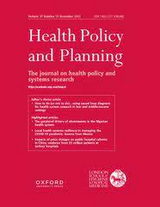Externe Publikationen

Awareness of India’s national health insurance scheme (PM-JAY): A cross-sectional study across six states
Parisi, Diletta / Swati Srivastava / Christoph Strupat et al.Externe Publikationen (2022)
in: Health Policy and Planning 38 (1), 289-300
DOI: https://doi.org/10.1093/heapol/czac106
Information
The literature suggests that a first barrier towards accessing benefits of health insurance in low- and middle-income countries is lack of awareness of one’s benefits. Yet, across settings and emerging schemes, limited scientific evidence is available on levels of awareness and their determinants. To fill this gap, we assessed socio-demographic and economic determinants of beneficiaries’ awareness of the Pradhan Mantri Jan Arogya Yojana (PM-JAY), the national health insurance scheme launched in India in 2018, and their awareness of own eligibility. We relied on cross-sectional household survey data collected in six Indian states between 2019 and 2020. Representative data of households eligible for PM-JAY from 11 618 respondents (an adult representative from each surveyed household) were used. We used descriptive statistics and multivariable logistic regression models to explore the association between awareness of PM-JAY and of one’s own eligibility, and socio-economic and demographic characteristics. About 62% of respondents were aware of PM-JAY, and among the aware, 78% knew that they were eligible for the scheme. Regression analysis confirmed that older respondents with higher educational level and salaried jobs were more likely to know about PM-JAY. Awareness was lower among respondents from Meghalaya and Tamil Nadu. Respondents from other backward classes, of wealthier socio-economic status, or from Meghalaya or Gujarat were more likely to be aware of their eligibility status. Respondents from Chhattisgarh were less likely to know about their eligibility. Our study confirms that while more than half the eligible population was aware of PM-JAY, considerable efforts are needed to achieve universal awareness. Socio-economic gradients confirm that the more marginalized are still less aware. We recommend implementing tailored, state-specific information dissemination approaches focusing on knowledge of specific scheme features to empower beneficiaries to demand their entitled services.
Kontakt
Cornelia Hornschild
Koordinatorin Publikationen
E-Mail Cornelia.Hornschild@idos-research.de
Telefon +49 (0)228 94927-135
Fax +49 (0)228 94927-130
Alexandra Fante
Bibliothekarin/Open Access-Koordinatorin
E-Mail Alexandra.Fante@idos-research.de
Telefon +49 (0)228 94927-321
Fax +49 (0)228 94927-130



